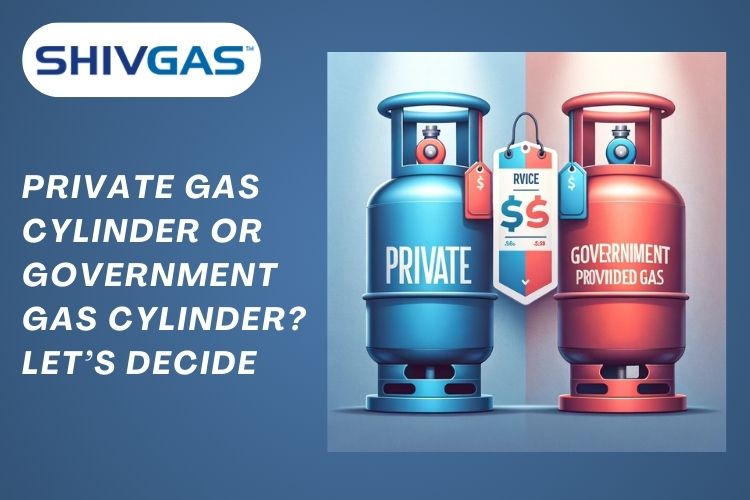
India is a price-sensitive country, where millions of people look for ways to cut down expenses wherever possible. One common area where savings often come into focus is household fuel—particularly gas cylinders. But here comes the real question: which option should you choose? Are government-backed gas cylinders the better choice, or do private gas cylinders offer more value? At first glance, government-provided cylinders may seem more affordable. However, private gas cylinder suppliers often stand out for their superior service quality and quicker delivery. This makes the decision far from simple.
To reach a clear conclusion, it is important to carefully weigh both sides. In this blog, we will explore the differences, benefits, and challenges each of them offers, so that you have the right information to make a well-informed choice for your household or business.
The market of LPG cylinders is very competitive, thanks to the presence of both government-based gas agencies and private players. To name a few, we have Hindustan Petroleum Corporation Limited (HPCL), Bharat Petroleum Corporation Limited (BPCL), and Indian Oil Corporation Limited (IOCL). One of the biggest advantages of these companies is that they can use various government schemes to attract customers.
Schemes like Pradhan Mantri Ujjwala Yojana (PMUY) provide subsidies to many households. This subsidy scheme is exclusive to government gas agencies only. Furthermore, the agencies are also exempt from a lot of taxes. This enables them to supply gas cylinders at a cheaper rate than the market value. Thus, due to the guarantee of subsidies to eligible households, they become a more preferred option.
The scheme involves offering 12 cylinders to every eligible family per year. Moreover, the subsidy system itself is also very simple, through DBT or Direct Benefit Transfer, the amount is transferred directly to the consumer’s bank account. Consumers pay the full price initially, but the subsidy amount is then reimbursed.
Many Indians are realising that what is cheaper does not necessarily mean they are better. The government distribution model is quite convoluted and demands a lot of time to get the benefits. Therefore, people are looking forward to buying a private gas cylinder, expecting to get more efficient operations. Among the different private players, SHIVGAS has been providing their services for over 30 years in the nation, providing premium quality experience to the customers.
It is true that private gas cylinder suppliers may not get benefits like government schemes, and see more fluctuation in pricing due to the nature of the market condition. They make up for this lack by providing top-notch services and flexibility to their customers. The government does have a robust network of authorised dealers who can supply to both rural and urban locations, but in most cases, there is a tendency for delay. Whereas private gas cylinder sellers are flexible to deliver gas cylinders anywhere, anytime.
Many private gas cylinder suppliers offer a long list of customization of their LPG cylinders. This feature alone makes them more viable options for the commercial and industrial sectors, apart from domestic usage. Moreover, government agencies can take 3-4 days to process the application for a new connection and can even stretch it out to 10 days to complete it fully.
But private gas companies can finish up the necessary document work within a 24-48-hour timeframe. Furthermore, customers can submit their connection request online, and once the documents are verified, their representative will contact them to assist with the installation process
We all know that the government schemes are what make them attractive suppliers in the first place. But why do they offer such schemes in the first place? Well, the general prices of LPG gases are determined based on the global crude oil prices, currency exchange rates, and domestic policies. Therefore, the Indian government tries to protect common people from such fluctuating pricing by providing such subsidies to eligible households.
Private gas cylinder suppliers do not have the luxury of providing any kind of subsidies. Neither do they get any kind of tax exemption from the government at all. Moreover, they are more open to the volatile nature of the fuel market and thus, see more fluctuating pricing in their product. Their prices may change based on various factors such as supply chain costs, import duties, and fluctuations in LPG demand.
Lastly, the prices of gas also vary city-wise, for example, right now the price of LPG in Mumbai is ₹802. But in Kolkata, it is around ₹829, which you have to pay in full at the time of purchase. However, this is something that is applicable to both government and private companies. The government gas suppliers can reduce this price slightly thanks to the PMUY scheme.
Read More:
Government vs Private LPG Gas Agencies: Which One is Better?
Government schemes might have been an attraction point to many people in India. But getting the right eligibility to opt for the benefits is a different story. According to the terms of the scheme,
Therefore, people who are out of this criteria need to buy LPG cylinders at the open market price.
This naturally leads to an important consideration: if you are already paying the full price for an LPG cylinder, why not choose an option that gives you greater value and efficiency? Private suppliers, for instance, focus on delivering enhanced services, safety, and reliability. With cylinders made from high-quality materials and backed by modern testing processes, private LPG providers ensure that you receive not only fuel but also peace of mind.
Moreover, many private suppliers are actively adopting greener practices by promoting sustainable LPG solutions and investing in advanced technologies to improve customer experience. This combination of safety, innovation, and eco-consciousness makes private LPG cylinders a strong alternative for those seeking more than just basic supply.
In the end, the decision rests with you. By comparing both government-backed and private cylinders, you can make a choice that best aligns with your household needs, service expectations, and long-term priorities.
Comment (0)